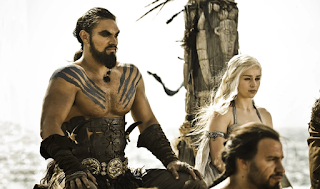The Elves of D&D
In
Dungeons and Dragons, there are 3 main types of elves. All three are described
as having an "...unearthly grace and fine features..." and “…flexible in the face of danger.” The
three main races are the High Elf, Wood Elf, and Dark Elf/Drow.
The
first elf listed in the player handbook is the High Elf, which is
split into two categories, friendly and non-friendly. Those of the former
include the “…grey elves and valley elves of Greyhawk, the Silvanesti of
Dragonlance, and the sun elves of the forgotten realms.” They are “…haughty and
reclusive, believing themselves to be superior to non-elves and even other
elves.” The latter include the “…high elves of Greyhawk, the Qualinesti of
Dragonlance, and the moon elves of the Forgotten Realms.” There’s also included
the sun elves of Faerun. These greatly varied elves are granted an intelligence
boost, an extra cantrip, an extra language, and proficiency with “elvish”
weapons. Only two of these groups of elves are given descriptions, the Faerun
sun elves and the moon elves. The sun elves have bronze skin, and black,
golden-blonde, or copper colored hair. The moon elves are alabaster colored,
which is sometimes tinged blue. Their hair tends to be silver-white, black, and
blue, but can also be blonde, brown, and red.
The
second of the three main groups is the Wood Elf. The wild elves, or grugach, of
Greyhawk, the Kagonesti of dragonlance, and the wood elves of Greyhawk and the
Forgotten Realms are all the variants of this race. These elves get a wisdom
boost, the elvish weapon training the High Elves get, an increased walking
speed, and “Mask of the Wild”, which allows them to try and hide in natural
phenomena. Their appearances are described as skin that is copperish in hue,
sometimes with a green tint. Their hair can be brown or black, but sometimes
blonde or copper.
While
there is not incredibly obvious racial undertones to these first two groups of
elves, the last group, the Drow, have a clear racial background. They are “Descended
from an earlier subrace of dark-skinned elves…” and were “…banished from the surface
world for following the goddess Lloth down the path to evil and corruption…”
They have black skin that “…resembles polished obsidian...” as well as white or
pale yellow hair. Their advantages lie in increased charisma, superior
darkvision, the dancing lights, faerie fire, and darkness cantrips, and weapon
training different from the first two. Their negative is that they have a
sunlight sensitivity, and have disadvantage when rolling attack and perception
checks in sunlight.
The
Drow, who are the darkest of the Elven races, “…pillage and slaughter the
surface dwellers…Their society is depraved…” In the player’s handbook, they are
the only race who’s society is fleshed out, and it is almost entirely negative.
The only spot of light for the Drow is Drizzt Do’Urden, a hero who is “…a
good-hearted defender of the weak and innocent.” As if the one hero could
balance out the complete darkness of the rest of the race. It’s especially
sharp the contrast from the High Elves, who have a variant that’s a pale as
alabaster. This race of dark-skinned elves has only one positive light to it,
lore-wise. While players could make their own Drow a positive influence trying
to take after Drizzt, that doesn’t change the fact that they are described as “…vicious
and dangerous…more often evil than not.”
The
wood elves, while lighter than the Drow, are also typically depicted darker
than the High Elves. These “copper-skinned” (red hued) elves are typically
found in, and have a strong affinity with, nature. While there isn’t much
information in the player handbook about their societies, they are reclusive
and have little trust for those who are not elves. It could be said that they’re
representative of the Native Americans, who were ever-so-kindly referred to as “redskins”
by the white settlers. This may not be the intent of the creators, but the
similarities between the Wood Elves and modern views on Native Americans are
very similar. Even the wisdom aspect coming from Native American elders being perceived
as wise. However, I would not call the wood elves’ representation as negative
as the Drow’s.
All information and quotes are taken from the D&D 5e player handbook




The elves of D&D have always bothered me when it comes to ideas of good versus evil and their viewpoints toward humanity. The ones you brought to focus in your blog, Drow and Wood Elves especially due to their undertones, and in the case of the Drow overtones, whiteness being viewed as good versus the more dark skinned races being morally evil or neutral. The obvious bits of the Drow being dark skinned and evil, despite being found underground making skin tone near impossible, are often violent and evil without remorse. Giving the impression of dark skin races equals evil. While the Wood elves inherently do not trust humans, which is fair due fear of hunting them but this only applies to this race primarily were as all other evils, sometimes even Drow at points, are more trustworthy giving the idea of racial discrimination of "You're human so your bad and we might have to kill you." Giving an impression of another dark skinned race being a threat to humans. Showing the only two dark skinned races of the elves and untrustworthy and threats to humanity so they are viewed as morally evil or at best neutral.
ReplyDeleteHow would you tie this to some of the critical concepts we've covered in class, like Young's "habits of whiteness" or Tolkien's influence on D&D? As a childhood reader of Dragonlance, I can totally see the influence of these racialized typologies in current video game series like Elder Scrolls. Then again, I also see series like Dragon Age taking postcolonial critiques and changing the rules a little bit at a time, so maybe old "habits" die hard, but they still die.
ReplyDelete